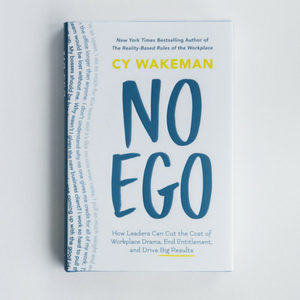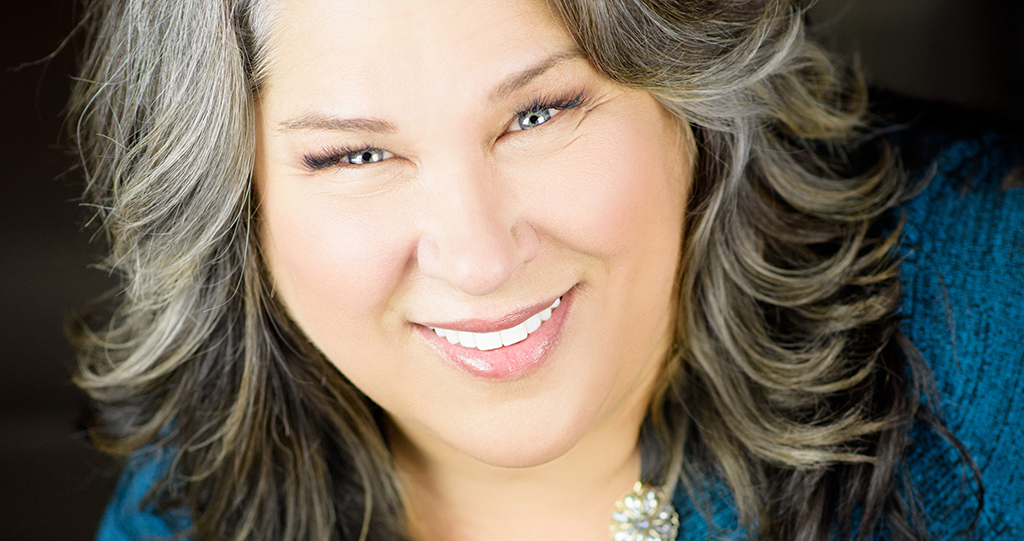Cy Wakeman: Lose the Drama, Invest in Yourself
Drama. It’s part of our lives whether we like it or not.
Or is it?
Cy Wakeman, a self-described “drama researcher” has been studying and talking about drama in the workplace for years, estimating that the average employee loses up to 2.5 hours and day in productivity simply because of that five-letter word – D-R-A-M-A.
PeopleTalk caught up with Wakeman ahead of her keynote at the HR Conference & Expo to discuss employee evaluations, workplace drama & change and more.
1. You define yourself as a “drama researcher”, what is that exactly and what led you to the position?
As a drama researcher, I research how much time and energy people spend in drama in the workplace. I have found that it is a surprising 2.5 hours per day, which adds up to roughly 816 hours of lost productivity a year. But worse yet, those are hours that people spend feeling miserable. Unfortunately, most business leaders have come to consider an acceptable or unpreventable cost of doing business.
I know that there truly is a way to lead drama-free teams. I was able to form teams of evolved people who could maintain health relationships with team members willing to share accountability for the state of their own work environment. I did it organically as an early leader and then sought to teach others how to lead in a more modern way using what we know about human behavior, psychology, and counseling.
Drama is emotional waste in the workplace. And in the workplace when we find other types of waste, we use process improvement methodology to address it. With drama, the waste is emotional, so with the same thinking, they way to get rid of that type of waste is with an improved process – an improved mental process. I came to understand that the true role of a leader was less about motivating and engaging, which I am not sure is even possible, and all about eliminating workplace drama, emotional waste with good mental processes.
I became interested in these phenomena when I was promoted from a counselor to a leader. I was surprised at how few people understood how their mind worked or how the world worked, and I saw them moving through the world unskillfully. So many people were getting played by their own ego and engaging in behaviors that would only damage relationships and take energy away from their own happiness and the desired results.
I was so convinced that suffering is optional and often self-imposed that I felt called to help people adopt more skillful ways of moving through the world, whether they continued to work for me or not.
2. Why is drama so bad for the workplace? Are there any examples of drama in the workplace that could be seen as a positive?
Drama is by definition negative; it is unproductive thinking or disruptive behavior. It is anything that takes energy away from happiness or results. It is a huge leak in the energy system. Drama makes things harder than they have to be. It is completely unnecessary and man-made. It is the result of moving through the world in a state of lower levels of consciousness, asleep rather than awake.
Drama is fueled by ego, the most primitive form or our intelligence. When in ego, the data we are collecting from the world is corrupted and therefore we act on limited or corrupted data. In the absence of drama, all the things we desire our teams to be are their natural state – innovative, collaborative, accountable, engaged. We don’t need different circumstances and our people are not broken; they are just locked into a human condition that they can evolve out of quickly with a few simple techniques like self-reflection. So many of the traditional leadership teachings are flawed as they are trying to problem-solve and team build with people who are in the grips of their own ego and a flawed view of reality. It just isn’t sustainable or workable.
Some people try to justify their or others’ drama in the workplace by saying it is passion or creative spirit – those things use energy in ways that bring a great return on the investment Drama is always a negative ROI – it takes energy away from happiness and results. There is always a much more efficient, healthy way to produce the same results – it is the hardest route to the desired outcome – it is not joyful or meaningful but painful and leaves residual pain in its path.
It is the difference between complaining and sharing an observation or asking directly for a need to be met. Complaining is drama at the start and becomes major drama quickly as the complaint isn’t acknowledged in the way the complainer intended it to be – the complaint was made with motive.

Cy Wakeman will be at the HR Conference & Expo in Vancouver, BC – April 28-29th. Tickets available ONLINE.
It was attempting to get the preference of the ego met. Beyond ego, an evolved person shares an observation and invites others to look at the information or asks for a need directly and whether or not the person receiving the information agrees or acts on it is left to the choice of the other person – no motive, just offering it for what it is worth. The drama ensues when the one offering the information is attached to the outcome or attempts to control the behavior of another. Attachment is the source of much suffering. Preference is the work of the ego especially when it attempts to trump the overall potential of the group goals or organizational needs.
3. What are some easy ways in which HR Professionals can promote resilience within their teams?
I define resilience as “the ability to stay the course in spite of obstacles.” So, to become more resilient, a team needs to focus on or grow in two ways.
First, they need to build as large of network as possible. They need to build positive relationship with as many experts and valued contributors as possible so when faced with an obstacle, they have a readymade “database” to “crowdsource.” A quick reach out to source potential ideas outside of themselves, to benchmark and stay abreast of how others are solving similar issues is key.
Secondly, they need to stay mentally flexible. They need to be fluent in reframing their thinking, questioning what they believe to be true, seeing things from new angles.
A great exercise for a team is to take a statement of reality and begin it with the word, “fortunately” and describe why what is happening to them is fortunate rather than disaster. By seeing what is happening as potentially for their higher good of the higher good of the company, they can unearth some possible clues to how to move forward successfully.
Leaders need to be careful not to collude with their teams and reinforce victim thinking. Many times when rolling out new initiatives, leaders let people vent and spend energy and meeting time focusing on “Why we shouldn’t have to” (which is just an argument with reality and an argument you will lose 100% of the time) or “Why we can’t” (which is pre-justifying a planned failure).
Leaders need to manage the energy of the team to focus on, “How we could” which immediately opens up innovation. I love the response to negativity, “Yeah but what if we could? How would we?”
I also love the phrase, “Given that…” which I use whenever people are using reality as an excuse or reason why they can’t do something.
An example is when someone says, “That is just impossible – we are two staff members short.” They are hoping as a leader, I will immediately agree with them and let them off the hook, but our customers rarely let us off the hook. So, to help them be mentally flexible to see if there is some innovation we can apply to the situation, I take what they say and put it in neutral terms and put the words, “Given that..” in front of it and repeat back to them. “Given that we have two staff members less than we prefer, how could we?”
4. In the you’ve been critical of how some organizations handled their performance reviews, since speaking out about it and offering your Employee Value Metric, what are some of the changes you have seen or comments you’ve heard from those that have implemented the new process?
I recommend that leaders focus on value delivered rather than performance. One’s performance is just part of the equation. Did the person consistently deliver what was required AND are they maintaining a state of readiness for what’s next AND did they get the results required in a way that was drama-free, emotionally inexpensively?
Organizations that have adopted this approach report have better conversations based in reality. They are focusing less on technical skills and more on teaming skills. To be emotionally inexpensive, employees need to be fluent in the competencies of personal accountability, change readiness, reality-based thinking, resiliency and be able to quickly align with the direction of the organization. They are reporting higher levels of accountability, engagement and results.
In the employee base, the response is often split. The high accountables love getting credit where credit is due and those low in accountability are not pleased at all at the new metric. There is a universal principle at work here – the same behavior cannot please a low accountable and a high accountable at the same time – it seems that you will always be upsetting one of these groups. I encourage leaders to upset the “right” group. Those high in accountability report feeling motivated by the differentiation between the groups. –
5. You’ve said in the past, “change is only hard for the unready”, how can people get ready for change?
If you find yourself struggling with what is coming next, then check these three areas for yourself:
- Your skillset
- Your approach
- Your willingness
Are you attempting to use an outdated skillset for a new reality? If so, get caught up and focus on developing your skillset.
Are you using a less than modern approach for a new expectation or metric? If so, search out those that are accomplishing the desire result and adopt their modern approach.
Are you resisting? Are you fighting reality or withholding your buy-in. Then get yourself on board, buy-in is a verb. Resistance is the work of the ego. Rather than resisting, say yes to what’s next and use your talents to mitigate the risks that you may be worried about.
Every step forward has risks. The value you can add is in using your expertise to find a way forward that can address those risks or challenges.
6. With more generations than ever in the workplace, how is such a wide variety of ages impacting how employees interact with each other?

Cy Wakeman has written three books, with her latest, No Ego, rated 4.7 out of 5 on Amazon.ca
In my organization we have only two value or mantras: Evolve Yourself and Love Wins.
Whether it is a new reality with a greater diversity of ages represented or a disruption in the business, success and happiness remain possibilities if people adopt these two mantras.
So, for those workplaces where people are focusing on their own evolution and where they are helping, not judging, diversity of any sort is a wonderful addition that broadens the world from which we can access ideas and create solutions.
But when people have stalled out and are allowed to skip the necessary “upgrades” they become “egocentric” or focused on their own preferred view of the world. When evolution isn’t expected or required, you begin to see how small many peoples’ worlds become.
If people if people are open and growing and leaning into not only to change the world but allowing themselves to be constantly changed by the world, then you will see diversity in ages represented as a wonderful platform from which to create.
People who focus on their evolution find that their worlds continue to expand and that this broadening of their worlds keeps them challenged and helps to move everyone into higher levels of consciousness.
I get concerned as many people are out promoting that one should bring their “whole” self to work. I would encourage you to bring your most “evolved” self to work.
Drama is a result of the human condition, not age situation.
If people focus on the lesson at the hand of reality – it should bring about tremendous growth and acceleration and amplification of their potential.
Diversity of ages should be a catalyst for growth and a foundation for resilience because we have so many more diverse points in the big crowd source of life. But unfortunately, too many people are judging and not helping.
Rather than focusing on Love Winning, they are focused on finding how others are wrong. A judgmental focus ensures that you get more attached to what you think you know for sure and leads to people doubling down rather than opening up. Those who are anchored in their concrete thinking, in their ego, begin to see the others as the enemy rather than the teacher or better yet the perfect addition to the team.
7. With more distractions in people’s lives than ever, what are some tips to tune out the drama and remain happy?
I believe that to remain happy is less about tuning other people out and more about tuning into your own thinking.
Drama is in you – it is the judgement or story you attach to a situation.
Your stress comes from your stories, not your reality. It isn’t about tuning others out but about tuning in to your own story line and then questioning your thinking.
My best advice is to stop believing everything you think.
Happiness is not the absence of challenge or reality presenting as you prefer. Happiness is a natural state of being when we cease attaching story to what we are seeing.
Reality is never as harsh as our story.
When others are suffering and I begin to judge them as bringing drama my way, I can either focus on my area of influence and stay out of their lane. Or, a great technique is to manage energy away from judging to helping.
When someone comes to me to gossip about another, I respond with a positive or neutral, boundary setting statement about the person or situation and then quickly move into asking, “How can I / we help?” That leaves the other person with a clear choice – if we are involved it is to help, otherwise, let’s not be involved and let others work through the world as they need or want.
8. You’ve covered a variety of HR related topics, from employee evaluations to keeping your ego out of the office to workplace drama, what the next trend that will impact workplaces?
I am currently fascinated with the ways in which we have over-rotated on what we thought might help and instead, with over-rotation is actually hurting. It appears that some of our preferred solutions of today have created the problems of tomorrow.
I am currently doing a great deal of research on engagement and how engagement without accountability creates entitlement. I have developed an engagement survey that allows the responses of raters to be sorted by their accountability levels so that we can listen to the right people – the credible witnesses.
I am also looking at the ways in which anonymity has eroded accountability.
Of course, we need safe and anonymous routes for the reporting of risky information but the vast majority of input in a modern workplace can be shared openly and professionally.
But our attachment to providing anonymity to almost all input has created a safe haven for trolling and providing opinions without responsibility for the manner in which they are shared or the actual facts of the situation being shared. I think we will be moving to arenas that facilitate a greater deal of shared accountability between employees and leaders for almost everything in the workplace from engagement, to safety, to results.
An international speaker, leadership expert and New York Times bestselling author, Cy Wakeman is globally recognized for her reality-based approach to leadership — one distinctly minus the drama. Backed by 20 years of experience, she solidly rejects the ‘fad’ of engagement and replaces it with a return of leadership to leaders, and productivity to business. She will be doing both a keynote (No Ego: How HR Leaders Can Cut the Cost of Drama, End Entitlement and Drive Big Results) and breakout session (Ensuring Our Teams Are Ready for What’s Next) at the HR Conference & Expo in Vancouver, BC – April 28-29, 2020.
For the latest HR and business articles, check out our main page.
Reader Feedback
We want to hear from you!
Do you have a story idea you’d like to see covered by PeopleTalk?
Or maybe you’ve got a question we could ask our members in our People & Perspectives section?
Or maybe you just want to tell us how much you liked the article.
The door is always open.









